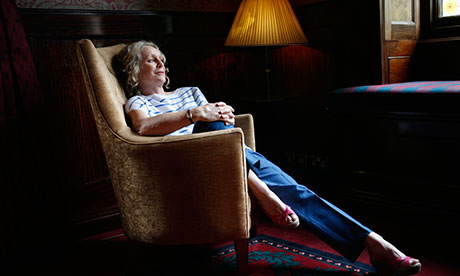The BBC series has made the White Queen Philippa Gregory's most popular heroine yet. Kate Kellaway talks to the author about history's forgotten women, the Tudors' teeth – and spats with Starkey


‘When you understand someone you love them a bit’: Philippa Gregory. Photograph: Gary Calton for the Observer
I am on the train to North Yorkshire where Philippa Gregory lives and have been so engrossed by her latest novel, I'm pages from the end when I alight at Yarm station. The White Princess takes over from where The White Queen, subject of the BBC drama series about the War of the Roses, leaves off and I have been wondering what sort of queen Gregory would make. It is the sort of game you start to play after immersion in her historical fiction – everyone I look at seems Plantagenet material.
We meet at a country house hotel not far from where she lives because of upheaval at home: she is building a barn on her 100-acre farm. She is the first person I see as I walk through grand stone portals to the reception. At 59, Gregory has an animated face framed by blonde curls. Although casually dressed for our mid-morning tea, her matching fuschia sandals and bag suggest she enjoys dressing up. She has queen potential – you can tell she knows her own mind, but she might have to work on being less friendly. We bond immediately over Max Irons, son of Jeremy, who plays the ludicrously dishy Edward IV in The White Queen and was recently quoted as saying: "Philippa Gregory – she can tell a story."
His compliment is an understatement; Gregory has written 24 novels and two books for young adults since 1987. Her Plantagenet series is five books strong and keeps turning like Fortune's wheel: the cast changes, but the narrative spokes stay the same – the pursuit of power, arranged marriages, a need for male heirs, swerving political loyalties. Gregory's audience of 10 million reads on.
The TV mini-series of The White Queen is also gorgeously escapist and has attracted swathes of viewers (the first episode was greeted by 5.3 million). Critics have swiped at its anachronisms: zips, hand rails and French manicures have all been spotted and the White Queen's clothes are "too white". Gregory recognises, as one of the show's producers, that television will "do something different from the novel", but you sense these difficulties would not have arisen in her meticulously researched fiction.
I ask her whether total historical accuracy is desirable in television anyway; surely the actors would all be short and have bad teeth? "Well, actually, their teeth would be good," she says. "You don't really get the rotting teeth until the Tudor period when the big explosion of imported sugar comes in. And they'd have washed more than we traditionally think. Their clothes would have been brushed and aired." Would we understand them though? "No. They'd speak a regional dialect of English but prefer to speak French, or they'd be happy to fall back on Latin."
More
We meet at a country house hotel not far from where she lives because of upheaval at home: she is building a barn on her 100-acre farm. She is the first person I see as I walk through grand stone portals to the reception. At 59, Gregory has an animated face framed by blonde curls. Although casually dressed for our mid-morning tea, her matching fuschia sandals and bag suggest she enjoys dressing up. She has queen potential – you can tell she knows her own mind, but she might have to work on being less friendly. We bond immediately over Max Irons, son of Jeremy, who plays the ludicrously dishy Edward IV in The White Queen and was recently quoted as saying: "Philippa Gregory – she can tell a story."
His compliment is an understatement; Gregory has written 24 novels and two books for young adults since 1987. Her Plantagenet series is five books strong and keeps turning like Fortune's wheel: the cast changes, but the narrative spokes stay the same – the pursuit of power, arranged marriages, a need for male heirs, swerving political loyalties. Gregory's audience of 10 million reads on.
The TV mini-series of The White Queen is also gorgeously escapist and has attracted swathes of viewers (the first episode was greeted by 5.3 million). Critics have swiped at its anachronisms: zips, hand rails and French manicures have all been spotted and the White Queen's clothes are "too white". Gregory recognises, as one of the show's producers, that television will "do something different from the novel", but you sense these difficulties would not have arisen in her meticulously researched fiction.
I ask her whether total historical accuracy is desirable in television anyway; surely the actors would all be short and have bad teeth? "Well, actually, their teeth would be good," she says. "You don't really get the rotting teeth until the Tudor period when the big explosion of imported sugar comes in. And they'd have washed more than we traditionally think. Their clothes would have been brushed and aired." Would we understand them though? "No. They'd speak a regional dialect of English but prefer to speak French, or they'd be happy to fall back on Latin."
More

No comments:
Post a Comment